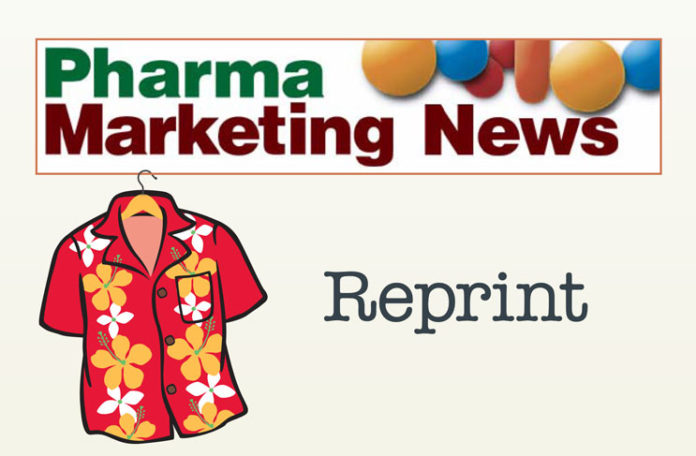Compliance with Regulations & Industry Guidelines
Reprint List Accomplishing Adherence
This article reviews presentations made at the recent eyeforpharma Patient Adherence and Persistence Summit including a presentation by David Baker, VP & General Manager of Shire’s ADHD Business Unit, who presented on ‘Best Practices for Fostering Adherence.’ He used the ADHD market as a case study.
Can Health Web Sites Improve Compliance?
For various reasons, it is hard to find a conclusively documented answer to a seemingly simple question: do interactive health education media improve patients’ health practices? In fact, a recent high-profile report attempted to answer that question and got it wrong: procedural flaws led them to an unjustified conclusion. The problem lies in seeking a broad general picture. More appropriate is to focus on the specific patient population, the distinct behaviors to be changed, and the particular tactics employed.
Closed-Loop Patient Education: MedTera and HealthPrize Team Up to Improve Medication Adherence & Health Outcomes
MedTera and HealthPrize Team Up to Improve Medication Adherence & Health Outcomes
MedTera recently partnered with HealthPrize Technologies, a web-based software company that motivates people to fill and stay on prescription medications, to bring together MedTera’s online and offline educational resources and HealthPrize’s online, interactive platform to educate people about their chronic diseases and incentivize them for taking their medications as prescribed.
Develop Effective Online Compliance Programs: Leverage Health Beliefs
According to a Jupiter survey, consumers don’t manage their health online because they have low confidence in their ability to use online health resources to improve their health. Pharmaceutical marketers must leverage health beliefs and models to design comparatively more effective adherence-related online marketing programs.
Topics covered include:
- Learn how self-efficacy predicts online consumers’ health-related behavior
- Define your online strategy and prioritize spending on online marketing tactics
Effective Pharma Adherence Programs Start With The Patient
Patient compliance may be a core objective for pharma marketers, but an international quorum of compliance experts at the recent eyeforpharma Patient Compliance 2004 conference in London agreed that the very term “compliance” is incorrect. In 22 in-depth presentations over 2 days, 30 speakers and panelists agreed that marketers need to stop analyzing compliance, and start understanding patients.
ePrescribing: What Role Should Pharma Play?
A panel entitled What Role Should Pharma Play in ePrescribing and the Point-of-Care? at a recent ePharma Summit conference held in Philadelphia, PA, discussed the issues facing pharmaceutical companies as electronic prescribing (ePrescribing or eRx) threatens to upset the “balance of power” between physicians, pharma companies, and payers at the point-of-care.
European Compliance Not Only Possible, But Leading Edge
As US pharmaceutical companies search for best practices to battle patient drop-off, their European counterparts have overcome Byzantine regulations and reduced margins to implement strikingly effective compliance programs directly to consumers.
Eyes on the Adherence Prize: How HealthPrize Uses Financial Incentives and Fun to Change Patient Behavior
This article provides details about the HealthPrize’s innovative, compelling approach to solving one of pharma’s most perplexing puzzle: how to improve medication adherence. Included is a summary of a Pharma Marketing Talk podcast interview of Tom Kottler, CEO, and Katrina S. Firlik, M.D., Chief Medical Officer, HealthPrize.
FDA to Test New Standard for Easy to Understand Drug Labels
Patients also need more effective counseling about their medications.
In an effort to make drug package inserts easier to read and understand — and perhaps to save money on printing costs — the FDA is planning to test single-page consumer information sheets that would replace the multi-page package inserts and medication guides widely used in retail pharmacies. However ‘dumbed down’ the label gets, it is still important that physicians and pharmacists take a more pro-active role in educating consumers about the drugs they are taking.
High Impact Content in Support of Rx Brands
Case Study: Alli – the Book!
In this article, PLG Health CEO Philip Lief describes how his company developed and marketed ‘The alli Diet Plan’ book for GlaxoSmithKline in order to increase the visibility, brand recognition, and sales of the over-the-counter (OTC) alli® weight-loss product.
Midwestern eMarketing Values
On the Internet it’s still about content, content, content. Some may consider this old-fashioned. But Siren Interactive, a midwestern interactive eMarketing firm, believes that valuable Internet content is a prime component to an effective eMarketing strategy for pharmaceutical companies.
Mobile Pharma Marketing: What’s the 411?
Mobile devices — especially cell phones — are becoming ubiquitous in the U.S. How can pharmaceutical companies use this technology for consumer acquisition and retention? To get some ideas, we interviewed Robert Flynn, President of Pulse Media Response, LLC, and summarize that discussion in this article.
Topics and issues covered include:
- Mobile Text Messaging
- Shortcodes: Ubiquitous as URLs?
- Immediate Response
- Mobile Marketing for Customer Acquisition
- Mobile Dialog for Compliance
- Text Messaging Best Practices
Moving the Needle on Adherence
Both the financial and social implications of non-compliance were the subjects of the recent 7th Annual Forum on Patient Compliance, Adherence and Persistency. This article presents highlights and case studies from this forum..
New Privacy Rules in Economic Stimulus Law
Will They Restrict Certain Pharmaceutical Marketing Practices?
This article reviews the medical privacy restrictions included in the American Recovery and Reinvestment Act, which President Obama signed into law on Feb. 17, 2009, and discusses the impact these restrictions might have on pharmaceutical marketing.
Pharma’s Plodding Approach to eMarketing
This article, written by health communications veteran, Harry Sweeney, is a frank assessment of the pharmaceutical industy’s plodding approach to e-communication and e-marketing based on a review of a recent industry conference.
Ready or Not: Gearing Up for the Expansion of ePrescribing
In a keynote address at a recent ePharma Summit conference held in Philadelphia, PA, Kevin Hutchinson, CEO and President of SureScripts, a company founded by the National Association of Chain Drug Stores (NACDS) and the National Community Pharmacists Association, looked at the changing landscape and inevitability of electronic prescribing (ePrescribing or eRx) and the implications and opportunities for the pharmaceutical industry.
SPECIAL! Includes: Pfizer’s Principles for Assuring Quality of Care by Electronic Prescribing Systems
Relationship Marketing via eNutrition
Review of ForMyDiet Platform
“Pharmaceutical companies that market treatments for conditions requiring diet management can provide educational and value added tools as a featured aspect of their marketing campaigns,” said Ami Assayag, CEO, Specialty Diets, Inc., developer of the web-based medical diet management platform ForMyDiet™.
Reporting Gifts to Physicians
Massachusetts and several other states have put either banned all gifts to physicians by pharmaceutical companies, placed limits on gifts, or or considering doing so. At least ‘sunshine’ acts have been proposed in Congress as well. This article reviews some aspects of these ‘sunshine’ laws and focuses on a recent CALPIRG analysis of drug company gifts to physicians.
Sales Effectiveness Meets eMarketing
Steve Woodruff, Founder and Principal Consultant of Impactiviti, and John Mack team up to review eyeforpharmas Sales Effectiveness conference, which was co-located with the eCommunication & Online Marketing Conference.
To Build Patient Adherence, Pfizer Puts Technology Behind The Curtain
While technology will enable pharma to execute complex consumer relationships, effective patient adherence programs will put tech to work as infrastructure – not as a primary communications medium.
This article summaries a presentation made by Diane Stafford, Head of Patient Relationship Marketing for Pfizer UK at the recent eyeforpharma Patient Compliance 2004 conference in London. In her presentation, entitled “The E-nabled Patient: Using Technology to help build valuable patient relationships,” Ms. Stafford asserted that you “can’ t use technology as [a compliance program] delivery mechanism if it’s not right.”
Ms. Stafford demonstrated how to implement 1-to-1 electronic relationships to deliver improved compliance, analyzed emerging new compliance initiatives using technology, and discussed successful approaches to develop patient ‘loyalty’ programmes and demonstrated their value.
Use of Twitter for Patient Support
Should Pharma Fill the HCP-to-Patient Social Media Vacuum?
Twitter has often been hyped as a great way to support customers. The customers of pharma are physicians and patients. But pharma Twitter accounts offer very little in terms of patient support. This article summarizes a survey that asked respondents to evaluate several ways in which Twitter could be used to improve patient support.
Waning Pharma Support of CME: The Plight of For-Profit MECCs
Recent headlines pulled from traditional media as well as from the blogo-sphere paint a bleak picture of the future of commercial support for continuing medical education (CME). Is the pharmaceutical industry getting out of the business of supporting CME? This article summaries Congressional testimony, ACCME data, and results of a reader survey on this topic.
A Web-based Therapy Management Program
A Review of Advoy
Disease management is a complex process for pharmaceutical manufacturers, but Internet-based programs can help drive market share, sales growth, and patient compliance.
Cedric Tuck-Sherman, director of eBusiness for Baxter BioScience, discussed his company’s experience with creating and managing a web-based therapy management program for chronic diseases during a recent Patient Persistence, Compliance and Education seminar sponsored by EyeforPharma.
The article includes the following sections:
- Rapid Communication
- Personal, One-to-One Interaction
- Mutual Trust



![6 Digital Tools at the Center of Healthcare Digitalization [INFOGRAPHIC]](http://ec2-54-175-84-28.compute-1.amazonaws.com/pharma-mkting.com/wp-content/uploads/2021/04/6DigitalTools_600px-218x150.jpg)




![6 Digital Tools at the Center of Healthcare Digitalization [INFOGRAPHIC]](http://ec2-54-175-84-28.compute-1.amazonaws.com/pharma-mkting.com/wp-content/uploads/2021/04/6DigitalTools_600px-100x70.jpg)




